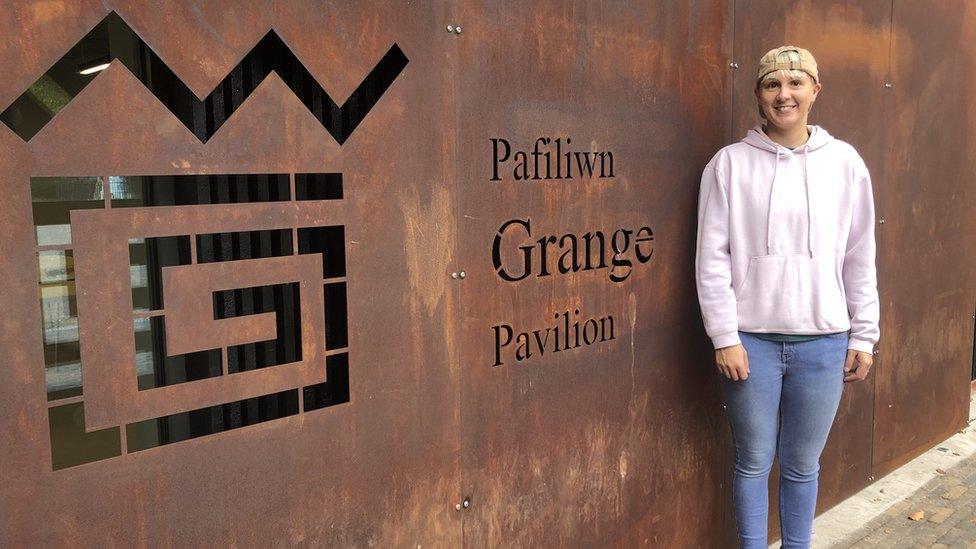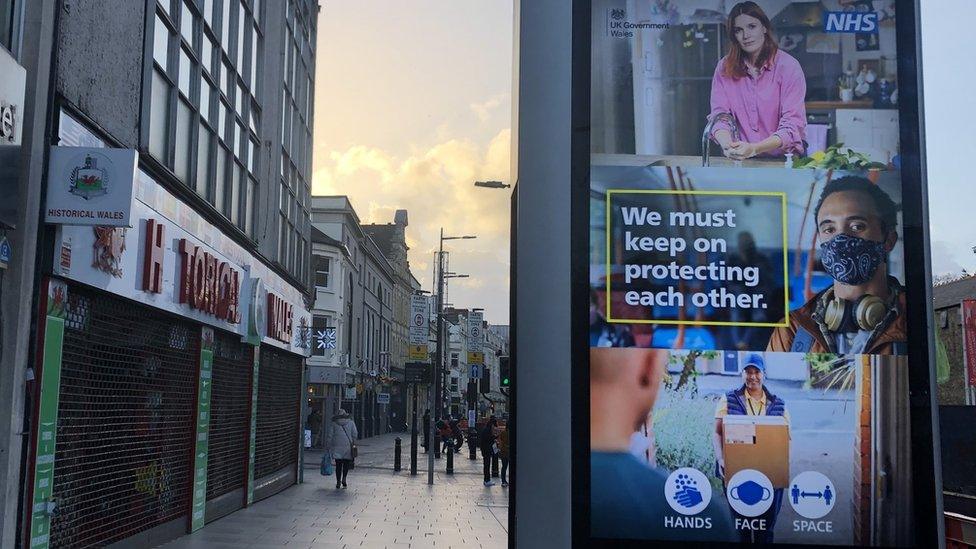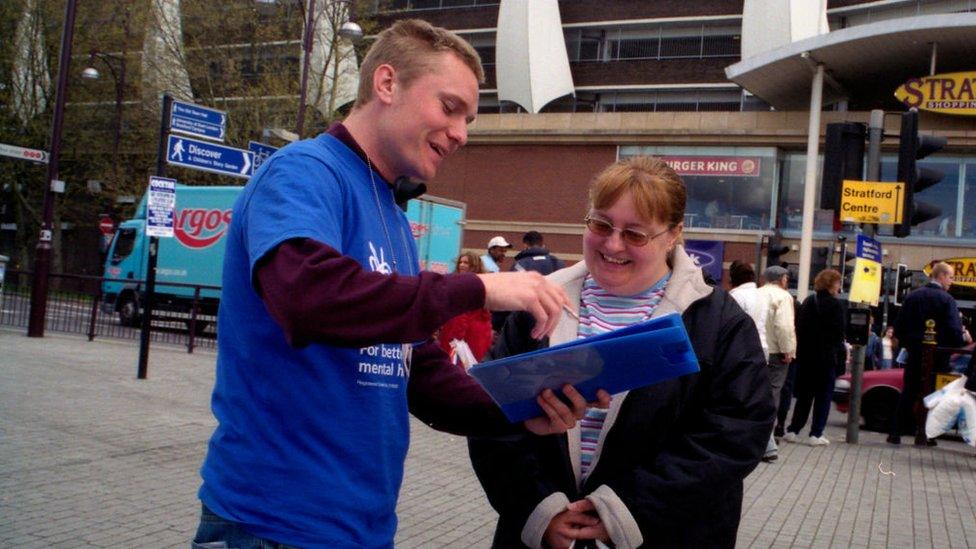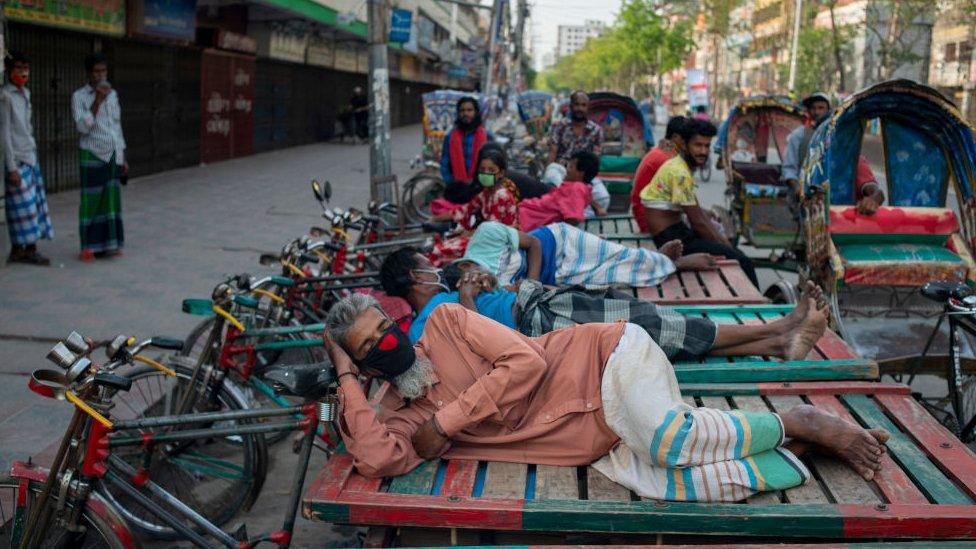Covid: Wales' firebreak lockdown 'has hit charities hard'
- Published
- comments

The Grange Pavilion in Cardiff has a £36,000 shortfall in its budget
Charities left struggling due to the coronavirus pandemic have said Wales' firebreak lockdown has hit them hard.
The 17 days of tough restrictions end on 9 November and after that events with up to 15 people indoors or 30 outdoors will be allowed.
But that will be too late for the Royal British Legion which has had to change how it sells poppies.
The Welsh Government said it had provided £24m to support charities and other groups during the pandemic.
The firebreak began a day after the legion launched its annual Poppy Appeal.
Veterans unable to sell poppies due to lockdown
People are still able to buy them at major supermarkets in Wales but for the first time in the 99-year history of the appeal, there will be no volunteers to sell them.
Street collections have also been scrapped.
The legion's director of fundraising Claire Rowcliffe said the timing was unfortunate as plans had been put in place before the firebreak for volunteers to safely collect donations.
"To have that taken away within a week or so of launching the Poppy Appeal must be so disappointing for our volunteers," she added.
The majority of the £50m raised UK-wide by the appeal last year to support veterans and their families was in cash.
This year the legion is encouraging people to donate electronically.

A table is set up at a supermarket entrance but there are no volunteer poppy sellers
The firebreak is being felt across the board.
In Cardiff, the Grange Pavilion opened its doors shortly before the first lockdown in March.
The former bowls pavilion in Grangetown has been transformed into a £2m community centre for people living in one of the most deprived parts of Wales, which is also the most ethnically diverse.
Breakfast clubs, a youth forum, sports clubs, after-school care, art and gardening projects have all been put on hold.
The pavilion was just beginning to welcome the community back when the firebreak was announced.
Centre manager Sophey Mills said they were dealing with a shortfall of £36,000.
"It's been gutting to be honest," she said.
"All of a sudden we've had to stop for another two weeks at least, but we know the community is going to pull together and help us out to make this work.
"There's a team of people trying to keep this place alive. We will come through the other end, we have to, but it's definitely hit us hard."

The Welsh Government says it has provided a £24m package of support to the third sector to help them meet their current challenges
The pavilion fundraising team has applied to Community Foundation Wales to try to shore up their finances.
Since the start of the pandemic the foundation has given £3m to grassroots organisations across Wales.
Chief executive Richard Williams said: "In a normal year the community foundation gives £2m and in the first six months we're at our highest ever grant-making levels."
The foundation is funded by a network of businesses and private individuals, but Mr Williams said as the crisis deepens he was increasingly worried about how long the funding could continue.
"From what we see, the worst is yet to come in terms of funding because what's happened this year is that organisations have ploughed into their emergency funding to release support for people," he said.
"That money's been used up and the way the financial markets have responded this year means we think there will be problems in the year ahead and so we're very worried about the implications for charities and communities in Wales."
The Welsh Government thanked charities and other groups for continuing to provide "invaluable services" during the pandemic.
"We have provided a £24m package of support to the third sector to help them meet these challenges," a spokesman said.
"We have also provided support through direct funding for areas such as hospices, mental health, domestic abuse, as well as increasing flexibility around grants."
- Published31 October 2020

- Published16 October 2020

- Published14 July 2020
